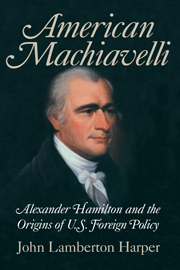Book contents
- Frontmatter
- Contents
- List of Illustrations
- Acknowledgments
- Miscellaneous Frontmatter
- Introduction
- PART I THE COMING OF NECESSITY
- PART II BATTLE LINES ARE DRAWN
- PART III SEIZING THE HELM
- PART IV INFORMAL ADVISER TO THE PRINCE
- 12 Return to Not-So-Private Life, 1794–1795
- 13 “Camillus” into the Breach
- 14 A High-Stakes Game: Washington’s Farewell Address, 1796
- 15 Transition to the New Regime, 1796–1797
- PART V A PRINCE IN HIS OWN RIGHT?
- PART VI THE LESSER OF EVILS
- Conclusion: Hamilton Then and Now
- Notes
- Bibliography
- Index
15 - Transition to the New Regime, 1796–1797
Published online by Cambridge University Press: 05 April 2013
- Frontmatter
- Contents
- List of Illustrations
- Acknowledgments
- Miscellaneous Frontmatter
- Introduction
- PART I THE COMING OF NECESSITY
- PART II BATTLE LINES ARE DRAWN
- PART III SEIZING THE HELM
- PART IV INFORMAL ADVISER TO THE PRINCE
- 12 Return to Not-So-Private Life, 1794–1795
- 13 “Camillus” into the Breach
- 14 A High-Stakes Game: Washington’s Farewell Address, 1796
- 15 Transition to the New Regime, 1796–1797
- PART V A PRINCE IN HIS OWN RIGHT?
- PART VI THE LESSER OF EVILS
- Conclusion: Hamilton Then and Now
- Notes
- Bibliography
- Index
Summary
Introduction
Unfortunately, it could not be said, in Hamilton’s view, that the government in Philadelphia was playing a particularly adept game in the fall of 1796. Toward the end of the year, the Federalist administration risked slipping off the moral high ground where he had tried to plant it with the Farewell Address. On October 27, 1796, the French minister Adet wrote Secretary of State Pickering to announce France’s new policy toward neutral shipping, adopted in July. Adet correctly pointed out that earlier French protests about U.S. toleration of British impressment of American seamen had gone unanswered by the administration. If the United States had supinely failed to defend its neutrality against British violations, it could hardly complain if France treated it in the same way, taking enemy property found on American merchantmen. In an insulting flourish, Adet leaked his letter to the fanatically pro-French Aurora, which published it on October 31. Adet’s maneuver, coordinated with Philadelphia Republican leaders, was patently designed to influence the popular election of presidential electors in Pennsylvania, scheduled for November 3.
Hamilton immediately wrote Wolcott that Adet’s communication demanded “a very careful & well managed answer.” In reply to Washington’s request for advice, Hamilton suggested that the president greet Adet next time he saw him “with a dignified reserve, holding an exact medium between an offensive coldness and cordiality. The point is a nice one to be hit,” he added, but no one would “know better how to do it” than Washington. The official reply, “one of the most delicate papers that has proceeded from our government,” must walk a similarly fine line and “save a great political interest which this step of the French Government opens up to us.” If properly handled, in other words, Adet’s communication presented a golden opportunity to embarrass the pro-French Republicans. Reply should be made not to Adet, but to the Directory through General Charles Cotesworth Pinckney, the South Carolina Federalist whom Washington had recently sent to Paris to replace James Monroe. Immediate publication of a reply, moreover, would both be unnecessary and stoop to the level of the other side.
- Type
- Chapter
- Information
- American MachiavelliAlexander Hamilton and the Origins of U.S. Foreign Policy, pp. 180 - 188Publisher: Cambridge University PressPrint publication year: 2004



